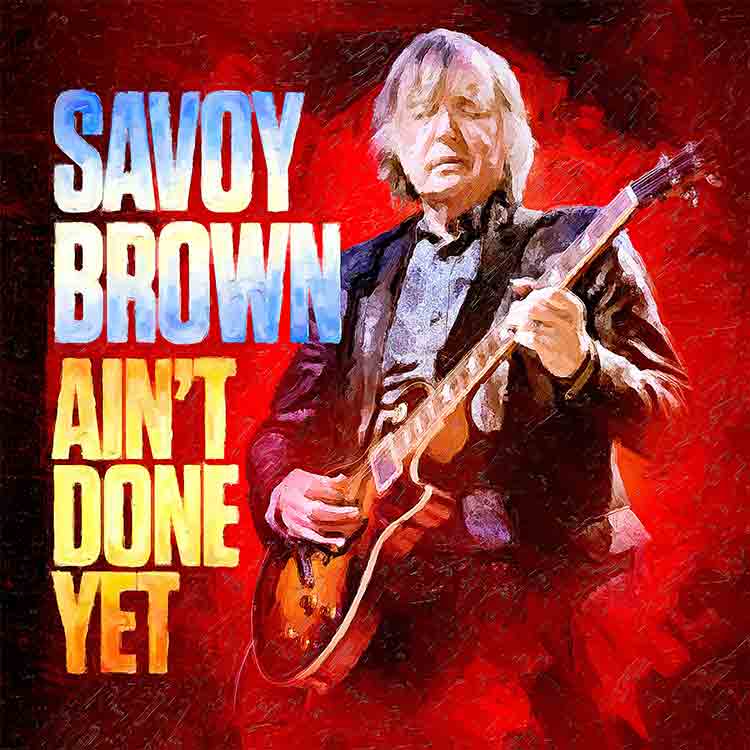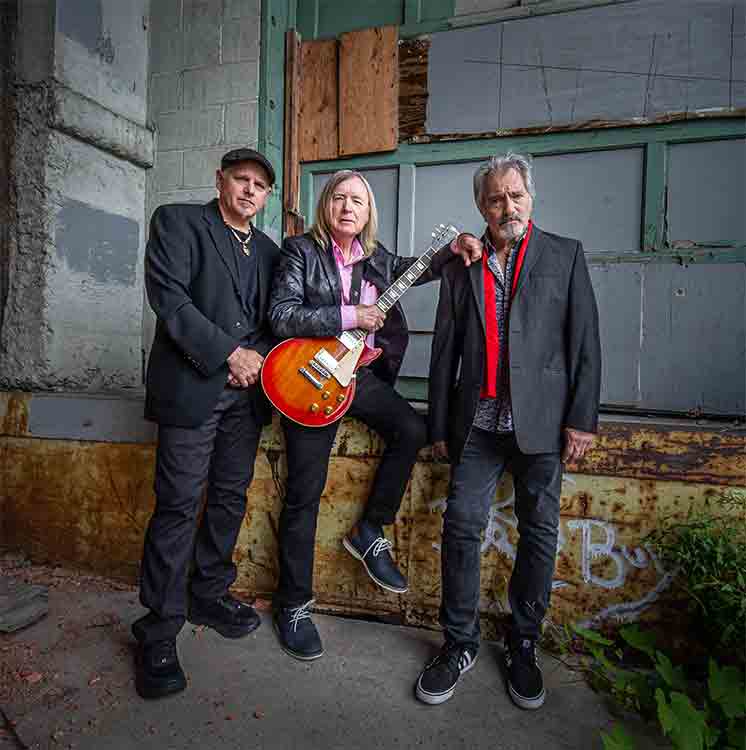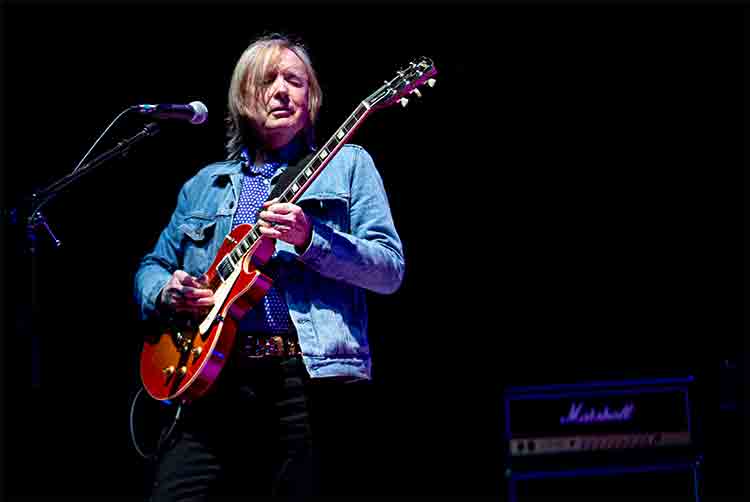
Formed in 1965 as the Savoy Brown Blues Band,
Kim Simmonds is the founder member and
sole continuity face of the band across the years
– and across the decades, since. Now, he talks to
Andrew Darlington about new CD:
‘AIN’T DONE YET’
by SAVOY BROWN
(August 2020, Quarto Valley Records)
When the man with the big cigar comes backstage and asks Pink Floyd ‘Oh, by the way, which one’s Pink?’… of course, there is no ‘Pink’. If the man with the big cigar came backstage at a Savoy Brown gig and asks ‘Oh, by the way, which one’s Savoy?’, they’d probably point to Kim Simmonds. The Blues is a hard road. You know Savoy Brown, they’re the Blues Rock band for which Kim is founding member and sole continuity face. He’s been doing this for half-a-century, and counting, some of the gig-goers to his concert audience weren’t even born when he first picked up his guitar and ambled onstage, so there must be a tendency to… slacken off? But no. The Savoy Brown August 2020 album defiantly declares ‘Ain’t Done Yet’, and it comes hot on the heels of the previous critically well-received ‘City Night’ (2019) album.
‘The past is over, won’t be back no more’ opens the uncompromising “It’s All Gone Wrong”, and yes, he admits ‘time’s moved on’, but the snarling hard-Rock exuberance and undiminished energy-levels say different, with ideas pouring from his fingers in relentless curling insidious guitar licks, it seems to me that it’s all gone very right indeed! For “Devil’s Highway”, which takes in decades of hard-touring, Kim’s voice assumes a gravel-weary late-Dylan resonance, but his ‘I don’t care, I’ve been around too long’ is denied by the sheer power of the long tricksy fade-out guitar interplay. Consuming his riffs and himself, transcending both.
‘The new album continues the approach I’ve been taking with the band this past decade,’ explains Kim. ‘The big difference with the new album is the multi-layer approach I took to recording the guitar parts. It’s all Blues-based Rock music. But I try to find new and progressive ways to write and play the music I’ve loved since I was a young teenager.’ So, when he started out – as a ‘young teenager’, he must surely have learned the Blues from record albums, imitating what he heard from LP’s. I wonder – how did he discover the Blues… was it from a friend? another musician? And which artists was he first listening to? ‘I grew up listening to 1950s Rock ‘n’ Roll and R&B, care of my older brother’ he recalls. ‘Little Richard, Elvis, Chuck Berry… those kinds of artists. Everything had a Blues foundation. When I was thirteen I started to realize what I really liked was the Chicago Blues style. The sounds of the Blues guitar I was hearing sounded like the sound of the future and I wanted to be a part of that. Guitarist Ennis L Lowery (‘Larry Dale’) who played with Champion Jack Dupree, BB King, Freddie King, Matt ‘Guitar’ Murphy, Earl Hooker, Elmore James. Howlin’ Wolf was one of my favourites. There were so many to inspire me. I could probably draw up a different list for you tomorrow.’
This energetic Chicago-style Blues was written into the band’s DNA from the get-go, when Kim formed the band as ‘The Savoy Brown Blues Band’ – named for the 1940s Jazz-Blues ‘Savoy’ label. It was 1965, in Battersea, SW London, part of the fiercely competitive and purist R&B boom. Who were the first Blues artists he saw in a live setting? Was it other Blues bands in London clubs? ‘I used to see The Yardbirds at ‘The Marquee’ and the Downliners Sect at my local church hall’ he begins. Then ‘Johnny Kidd and the Pirates at Wimbledon Palais, a little earlier than that. Georgie Fame at ‘The Scene’ club. Zoot Money at ‘The Flamingo’ in Soho.’
Their debut seven-inch single “I Tried” c/w “I Can’t Quit You Baby” (Purdah 45-3503) is a rough and raw respectably-busy driving Blues with wailing harmonica and Elmore James-style riffing over a Texas Blues-song originally done by Larry Davis and Fenton Robinson. Bass-player Ray Chappell comments ‘we recorded this in 1966, somewhere in central London, I forget the name of the studio. It was produced by Mike Vernon for his Purdah label. Only ninety-nine copies were pressed – there’s no income tax to pay that way! The label was a hobby-horse of Vernon’s before he formed Blue Horizon records. These sell for up to £1000 these days. I don’t even remember what happened to my copy.’
But the short-lived Purdah venture did lead to an up-link to Decca, for the ‘Shake Down’ (1967, Decca LK4883) album, with Vernon still on hand in the producer’s chair for a set of ‘rugged, tough-edged, yet sympathetic Blues material’ (‘Record Mirror’). There were reliable covers heavy on Willie Dixon (“I Ain’t Superstitious”) and John Lee Hooker (“It’s My Own Fault”), with a strong early cover of BB King’s “Rock Me Baby”. Black Blues vocalist Brice Portius was soon to quit, and drummer Leo Manning went on the join Bob Brunning’s Sunflower Blues Band. For over the years and albums to come – virtually an LP a year, there was to be a confusing coming and going of musicians… check out their Wiki entry for columns of names who contribute long or short-term stints, with link-points to Juicy Lucy, Blodwyn Pig, Fleetwood Mac, UFO and constellations strewn as far as Foghat.
Second album ‘Getting To The Point’ (1968, Decca SKL4935) has new deep-voice Chris Youlden sharing writing credits with Kim, who throws in a few other songs of his own (“The Incredible Gnome Meets Jaxman”) as well as a Muddy Waters (“Honey Bee”) and Willie Dixon’s “You Need Love” which would be the template for Led Zeppelin’s own revision “Whole Lotta Love”. Next, for ‘Blue Matter’ (April 1969, Decca SKL 4994) – with David Anstey’s creepy cover-art of a monstrous being rising from the evolutionary mire calculated to grab attention from Record Store window-displays, the ‘NME’ reviewer commends the glowering horns that infuse “Train To Nowhere” as ‘a group number loaded with atmosphere, drums and trombones pushing along the train-time beat with hushed Chris Youlden’s vocals. Youlden’s relaxed singing goes on to provide some of the best moments on an impressive side one’ while for the second side, recorded live at Leicester College, guitarist ‘Lonesome’ Dave Peverett takes vocals for a flu-stricken Chris.
‘A Step Further’ (September 1969, Decca SKL 5013) is another studio/live set that lifts off with the punchy sophisticated ‘from hot to cool’ groove of the Chris-penned desolation-fatigue single “I’m Tired” (F 12978), with side two made up of a single 22:02-minute medley “Savoy Brown Boogie” recorded live at ‘The Cooks Ferry Inn’ in Edmonton. Studio work, as he explains, is tight and controlled, whereas playing live allows a spontaneity rarely captured on record. Here, they’re freed up to hang loose. Then there’s the well-received ‘Raw Sienna’ (May 1970, Decca SKL 5043), made up of all-original material by Kim or Youlden – including honest down-to-earth single “A Hard Way To Go”, and Chris’ startlingly explicit ‘I sleep with the sun and rise with the moon’ addiction-diary “Needle And Spoon”. Audiences knew Velvet Underground and the Stones “Dead Flowers” – but this, ‘when you’re married to H, then you’re married for life’ adds a richer narcotic meaning to the album title. Although this was to be Chris’ final Savoy Brown album, because for ‘Looking In’ (October 1970, Gatefold SKL 5066) ‘Lonesome’ Dave takes vocals. Enhanced again by David Anstey’s cover-art, this time of a goblin peering into the eye-socket of a huge skull, it takes them into the UK album chart and the mainstream of Blues Rock – ‘the lyrics and the feel fit today, and are part of today’ (‘Melody Maker’), by touring relentlessly.

Again there were changes. After the rest of the band spin-off to form Foghat, Kim recruits former members of Chicken Shack, until, by both ‘Street Corner Talking’ (September 1971, Gatefold sleeve TXS 104) and ‘Hellbound Train’ (March 1972, Decca Green Label TXS 107) they crack the US ‘Billboard’ album Top 40. With gritty Blues-stomp hit track “Tell Mama” on the former – ‘quit my job, ain’t got no money… this life I live has got me sick through and through,’ with Kim playing slide using a green Heineken bottle on his Flying-V guitar; and the latter headed off by ‘the epic relentlessness of “Hellbound Train”, complete with clickety-clack drumming’ (‘Q’ magazine). All the while, they were generating massive responses from extensive cross-America touring.
There have been lots of musicians playing in different Savoy Brown line-ups. Kim’s probably been asked before, but was there a ‘Classic Line-up’, when everything seemed to fall into place naturally and organically? ‘I think the very first line up, with John O’Leary, was one of my favourite line-ups and one of the best’ he muses. ‘Everything fell into place, as you say. The line-up with Chris Youlden singing in the late sixties, and the one that broke the USA was probably ‘the Classic’ in many people’s minds.’
When he first got to the States and saw Blues artists playing in their own settings, it must have been different. Did it affect your attitudes to the music that you play yourself? ‘Watching the Blues artists live was more real, of course, than listening to the records. At that time, I saw BB King playing to an all-black audience prior to his breakthrough to the mainstream. I jammed with Albert Collins at a club with only a few people in attendance. Ditto Bobby Bland. I was quite a seasoned musician myself by then so it didn’t change anything with me.’
Reading back through their press notices, the British music papers were progressively less supportive, Savoy Brown were always the band who were ‘big in America’ where they tour endlessly. And with fickle critical attention distracted away by Glam and Glitter, Punk and New Wave, the band simply continue doing what they’ve always done best. While American critics – such as academic Lillian Roxon, recognise ‘The Savoy Brown Blues Band is one of half-a-dozen English bands that conscientiously play American Blues, careful to be faithful to the original.’ The ‘Boogie Brothers’ (1974, Decca SKL 5186) LP unites Kim with a Brit-Blues supergroup line-up of Chicken Shack’s Stan Webb and Miller Anderson, formerly of Keef Hartley.
‘I like to think that as we’ve matured as musicians, our fans have also matured and can accept what we’re playing now’ Kim explained, ‘we have a much wider acceptance in America of course, and that’s why we spend so much time there. There’s a lot more inventiveness in America because it is such a big place and the different environments obviously shape the music. In America there’s room to literally do your own thing.’ Both ZZ Top and Kiss open the bill for marathon tours, playing alongside Steppenwolf, the Doobie Brothers and many others. As Kim writes on the kicking full-tilt Boogie ‘Ain’t Done Yet’ album title-track, ‘the road can be a hard place, many come and go, it’s so hard to leave, when it’s all you know.’ With dates at the Fillmore’s East and West they were opening up teenage American eyes to their own home territory Blues artists. And, with power-ballad “Run To Me” – formerly a UK hit for Smokie, they broke the US singles chart in October 1981, by which time Kim had decisively relocated to live in the States.
There was never a psychedelic, Freak-beat, Prog-Rock or Arty-experimental phase. For Savoy Brown, there was never that ‘man with the big cigar’ I’m Gonna Make You A Star moment, there was no Svengali, no Andrew Loog Oldham or Tony Secunda manipulator persuading them into outlandish costumes for PR photo-shoots or doing strategic cover-versions in order to gatecrash ‘Top Of The Pops’. Savoy Brown always followed their own vision, did pretty much what they chose to do, and played the music they loved. Proclaiming ‘I’m not going to try to please’ like a statement of intent as far back as “I’m Tired”. Continuing with the hellbound locomotive theme, and subtitled ‘An Album Of Acoustic Music’, ‘Slow Train’ (1986, Relix Records RRLP2023) is virtually a Kim solo tribute to his mentors, Robert Johnson (“Ramblin’ On My Mind”), Lightning Hopkins (“Come Back Baby”) and Willie Dixon (“Little Red Rooster”), forming a seamless continuity. ‘We started out playing Blues in the accepted sense, but to my mind we’re still playing Blues’ he argues.
Kim’s “Soho Girl” on the new album, listens to Muddy Waters. So, who else are you listening to now? ‘I still listen to the same music as I grew up with’ he admits. ‘All the late fifties and early sixties Blues artists. I belong to a streaming service so I get to hear all the new album releases too. You name it – in the Blues-Rock area, and I’ve listened to it. I’m always looking to old – or new artists for inspiration.’
Savoy Brown are the Blues Rock band for which Kim is founding member and sole continuity face, a line-up now completed by Pat DeSalvo (bass guitar), and Garnet Grimm (drums). For ‘Ain’t Done Yet’ they take the old half-familiar rib-shapes and skeletal-structures of Blues-Rock, then twist and mutate them into renewed configurations, which is what the original Blues masters always did anyway. The nice slide on “River On The Rise” plugs back into levee-busting tradition with overtones of gathering troubles as metaphor for dark times ahead – ‘better take the high ground’. Is that political aspect consciously present in the song, about the mood in America today? ‘There’s no political or social underpinnings’ he says, ‘but you’re the first person to bring up the connection. It could be easily heard in that context.’

Then there’s the hard guitar-burn of “Borrowed Time”, contained within a solid amped-up Blues framework, ‘when I look, so many people gone.’ There’s harmonica on the motorvatin’ cruise of “Jaguar Car”, built for comfort as well as speed, and vintage Blues guitar on “Rocking In Louisiana” where Kim dreams of finding solace ‘in an old roadhouse with some boogie piano.’ “Feel Like A Gypsy” slows the pace into the more acoustic contemplation of ‘listening to the night… playing my guitar’, into the dextrously extended Santana-style instrumental section, which anticipates the final searing “Crying Guitar” instrumental. ‘‘Ain’t Done Yet’ is a personal statement, of course’ Kim emphasises. ‘“Feel Like A Gypsy”, “Soho Girl” and “Crying Guitar” were older songs that I had, and the others were written last year. With “Jaguar Car”, I wanted to write a Blues about a car other than a Cadillac! On a sadder note Ben Elliott, the owner and engineer at the studio I recorded at (Showplace Studios), passed away shortly after the recording. Ben was ill during my session and he put his heart and soul into the recording. When I listen to tracks on the album myself I can’t but think that it’s Ben’s gift to me. He did such a good job.’
My take on the album is that there’s a divide between the lyrics – with the resigned ‘I never thought to myself, I’d be around so long’ and ‘so many people gone’… which contrasts with the sheer energy and undiminished vigour of the performance. Would Kim agree with that analysis? ‘A very good insight’ he concedes. ‘I’ve been very lucky in life with my health and with the energy I still have. I’ve survived two life-threatening problems where friends of mine haven’t. I tried to put a little of those thoughts into the songs coupled with the ‘human spirit’ aspect too.’
The Blues is a hard road. Savoy Brown have put out a dozen albums just since 1998, and have toured nonstop forever – one-hundred-plus shows per year. It takes nothing less than a global pandemic to pause them…
BY ANDREW DARLINGTON
